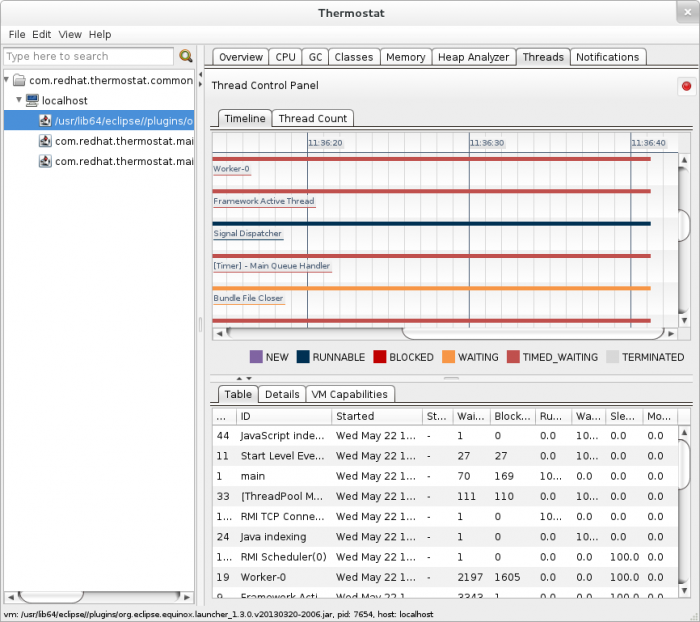| Fedora Test Days | |
|---|---|
| [Thermostat 0.9.0] | |
| Date | 2013-05-23 |
| Time | all day |
| Website | Thermostat Website |
| IRC | #fedora-test-day (webirc) |
| Mailing list | test |
What to Test?
Today's installment of Fedora Test Day will focus on Thermostat
Who's Available
The following cast of characters will be available testing, workarounds, bug fixes, and general discussion ...
- Development - Severin Gehwolf (jerboaa), Omair Majid (omajid), Jon VanAlten (vanaltj)
Prerequisite for Test Day
- An updated Fedora 19 pre-release (physical machine or virtual machine), or a live image. Tips on using a live image are available at FedoraLiveCD.
| Architecture | SHA256SUM |
|---|---|
| x86_64 | 621148638bbf87a8fe3cdf3cc51615e4cf4d311f5c80abcdc4852229935e99f6 |
| i686 | 32bb499443145799c3236396be1cddc87aba46caa259c3721f8d978df6bfd0ad |
- You will either need a physical machine or a virtual machine running a pre-release of Fedora 19
- Make sure that your system is up-to-date. You can update your system using the update manager.
- If you have a F19 installation, you should have the following packages installed:
thermostat-0.8.0-0.1.20130521hg97e66ed2e4ae.fc19 thermostat-webapp-0.8.0-0.1.20130521hg97e66ed2e4ae.fc19
You can download this build for your architecture from Koji and use sudo yum localinstall thermostat-0.8.0-0.1.20130521hg97e66ed2e4ae.fc19*.rpm thermostat-webapp-0.8.0-0.1.20130521hg97e66ed2e4ae.fc19*.rpm in order to install it.
Perform Testing
Please perform as many of the test cases listed as you have the time and the resources to complete, and fill out your results in the table below. You do not need a Fedora account to fill in the table. It is recommended to perform the tests in order, since some tests build on things explained in previous tests.
Preliminary Information
Note that thermostat consists of four (4) services. Each of which can be run on a different host. The first service is Thermostat storage (a.k.a. the database). The second one is the Thermostat webservice. This one has been introduced for security reasons. If you do not plan to use Thermostat in a distributed environment - or don't care about security - this service can probably be skipped. The third service is the Thermostat agent. It is a service which one needs to run on every host where JVMs should be monitored. The last component in this quartet are various forms of Thermostat clients.
Planned Tests
- QA:Testcase_thermostat_in_path
- QA:Testcase_thermostat_storage
- QA:Testcase_thermostat_logging
- QA:Testcase_thermostat_agent
- QA:Testcase_thermostat_service
- QA:Testcase_thermostat_swing_client
- QA:Testcase_thermostat_shell
- QA:Testcase_thermostat_command_channel
- QA:Testcase_thermostat_heapdump
- QA:Testcase_thermostat_thread_monitor
- QA:Testcase_thermostat_stand-alone_commands
- QA:Testcase_thermostat_custom_plugin
- QA:Testcase_thermostat_web_basic
- QA:Testcase_thermostat_web_auth
- QA:Testcase_thermostat_remote_monitoring
Unplanned Testing
As well as running the formal test cases, you can help simply by using Thermostat and/or Thermostat's Eclipse integration and report any problems you come across in the course of your typical use, even if they do not match up with any of the test cases. If unsure if something is a bug feel free to ask in #fedora-test-day.
Test Results
If you have problems with any of the tests, try and report a bug. Thermostat bugs should be reported to Thermostat's Bugzilla. You will need an icedtea bugzilla account to report bugs for Thermostat. Creating one is easy, and we will help you do this if you ask in IRC.
If you are not sure of the appropriate component, please check in IRC before filing, there are many possibilities. If you are unsure about exactly how to file the report or what other information to include, just ask on IRC and we will help you.
Once you have completed the tests, add your results to the Results table below, following the example results from the first line as a template. The first column should be your name with a link to your User page in the Wiki if you have one, and the second should be a link to the Smolt profile of the system you tested. For each test case, use the result template to describe your result, following the examples in the Sample user row.
| User | Version | Storage | Logging | Agent | Service | Swing Client | Shell | Cmd Chan | Heap | Thread | Commands | Plug-in | Web Basic | Web Auth | Remote | References |
|---|---|---|---|---|---|---|---|---|---|---|---|---|---|---|---|---|
| Sample User |
| |||||||||||||||
| lzachar |
| |||||||||||||||
| Severin Gehwolf | ||||||||||||||||
| Andrew Azores | ||||||||||||||||
| Pavel Tišnovský | ||||||||||||||||
| omajid |
| |||||||||||||||
| Jana Fabrikova |
|

